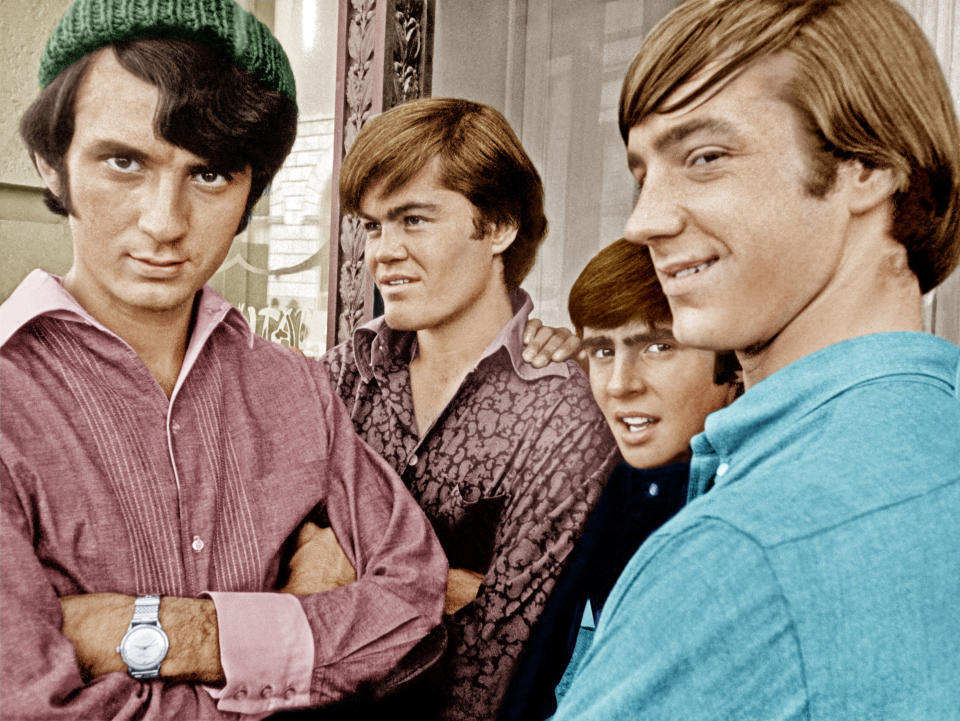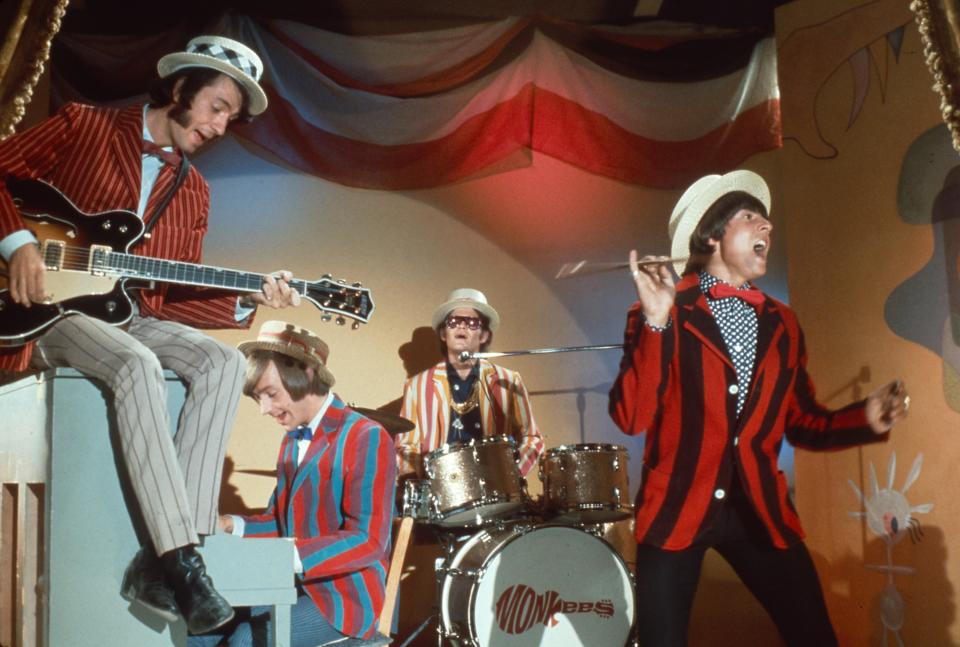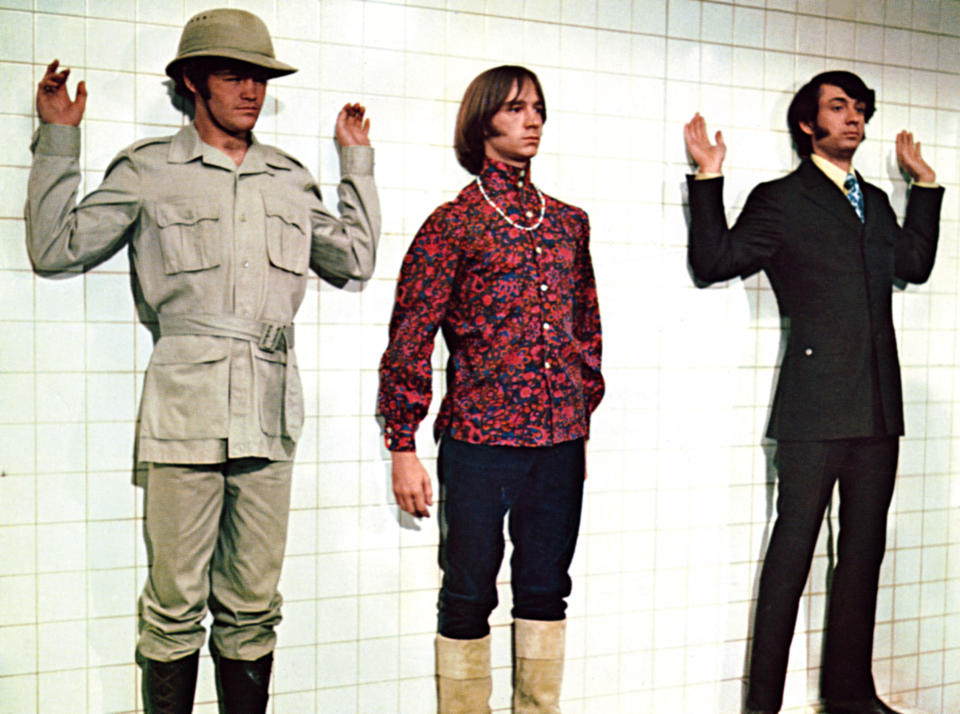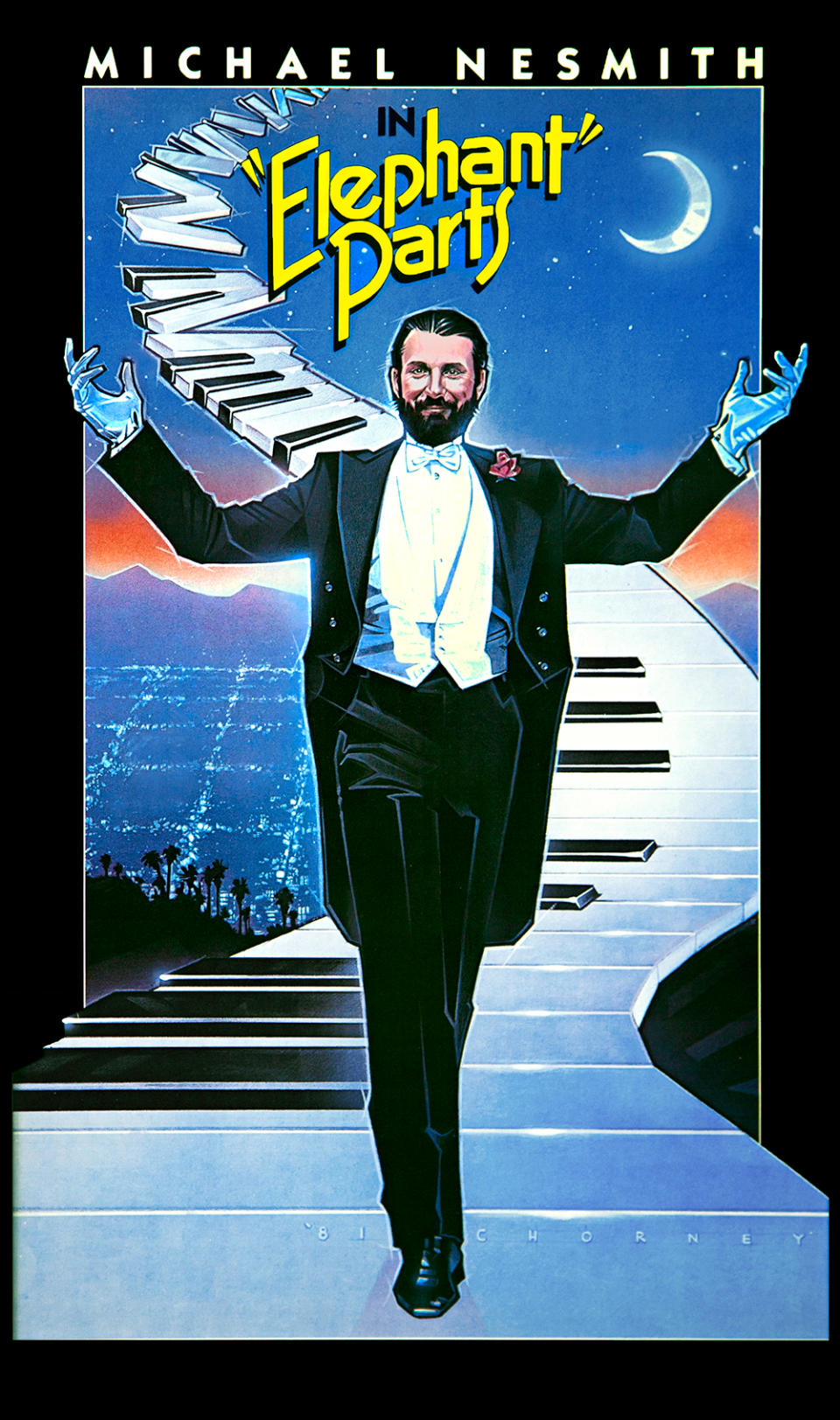Michael Nesmith Dies: The Monkees Singer & Guitarist Was 78
- Oops!Something went wrong.Please try again later.

Michael Nesmith, the Grammy-winning, wool-capped singer and guitarist of the Monkees and a pioneer of the music video, died today of natural causes his home in Carmel Valley, CA, his family has announced. He was 78.
“With Infinite Love we announce that Michael Nesmith has passed away this morning in his home, surrounded by family, peacefully and of natural causes,” the family said in a statement to our sister publication Rolling Stone. “We ask that you respect our privacy at this time and we thank you for the love and light that all of you have shown him and us.”
More from Deadline
Steve Bronski Dies: Cofounder Of Gay Pop Pioneers Bronski Beat Was 61
Carmen Salinas Dies: Mexican Telenovelas And Film Star Was 82

Everett Collection
Nesmith, whose laconic, deadpan comic style was a key contribution to the slapstick humor of the band’s self-titled hit 1960s sitcom, also was the group’s staunchest advocate for musical integrity. He fought for the band’s right to play their own instruments and contributed some of the Monkees’ most cherished and enduring songs, most notably the country-tinged “Papa Gene’s Blues” (with its familiar refrain, “I have no more than I did before but now I’ve got all that I need…”).
The Monkees were the made-for-American-TV group that hit the airwaves in 1966 at the height of Beatlemania. The NBC series aired only two seasons but won the 1967 Emmy for Outstanding Comedy Series and launched the group to radio stardom. Their first hit was “Last Train to Clarksville,” which started a run of smash singles stateside. The song also was the first of three chart-toppers, followed later that year by “I’m a Believer” — which spent seven weeks atop the Billboard Hot 100 and also topped the UK chart — and 1967’s “Daydream Believer.”
The quartet’s string of hits also included “Pleasant Valley Sunday,” “(I’m Not Your) Steppin’ Stone,” “Valleri” and A Little Bit Me, A Little Bit You.” The TV show’s catchy “(Theme from) The Monkees” also was released as a single in some territories and remains a singalong standard.
The band’s early albums even more of a commercial force. Its 1966 debut set The Monkees spent 13 weeks atop the Billboard 200. Its 1967 follow-up More of the Monkees — released just four months later — upped the ante, topping the album chart for 18 weeks. Both discs are certified five times platinum.
Another four months later came Headquarters, which was No. 1 for a week, then Pisces, Aquarius, Capricorn & Jones Ltd., released in November 1967 and a five-week chart topper. Both have sold more than 2 million copies. The Birds, the Bees & the Monkees (1968) peaked at No. 3 and would be the band’s last top 10 set. A pair of compilation albums — 1976’s The Monkees Greatest Hits and 1986’s Then & Now: The Best of the Monkees — also went platinum.

Everett Collection
The NBC sitcom was created by Bob Rafelson and Bert Schneider as an American answer to The Beatles’ A Hard Day’s Night with a heavy dose of Marx Brothers. The four actor-singers recruited through ads in Variety and The Hollywood Reporter would be the Texas-born Nesmith, the British stage actor Davy Jones, former Hollywood child actor Micky Dolenz and scenester of the Greenwich Village and Laurel Canyon folk music communities Peter Tork. All of the band members sang, with Dolenz also playing drums, Tork on bass and keyboards, and frequent frontman Jones often playing a tambourine.
Jones died in 2012 and Tork in 2019.
Peter Tork Dies: The Monkees’ Affable Bassist Was 77
Debuting in August 1966, The Monkees proved particularly popular with children, though it never was a ratings juggernaut, airing on Monday nights opposite Gilligan’s Island and later Gunsmoke.
The TV show wrapped in 1968, but the group kept recording and touring for another few years. Jimi Hendrix was, notoriously, the opening act for their 1967 jaunt, to the dismay of many parents who took their teenyboppers to see the teen-idol Monkees.

Everett Collection
The following year saw the release of Head, the Monkees’ psychedelic period-piece answer to the Beatles film Help! Directed by Bob Rafelson — who co-wrote the film with a then-rising multihyphenate named Jack Nicholson — the plot-challenged pic starred the four Monkees in a host of capers.
Although the series was short-lived, was short-lived, the band’s musical popularity and legacy of hits would last well into the 21st century. Nesmith mostly resisted the group’s various comebacks and reunion tours — rumors of tensions within the band, particularly between Tork and Nesmith, reach back to the ’60s — but the guitarist did take part in a 2012 reunion tour and performed on the 2016 Monkees album Good Times!
Just last month, Nesmith and Dolenz wrapped a farewell tour with a show at the Greek Theatre in Los Angeles. A 2018 Nesmith-Dolenz tour was postponed when Nesmith underwent quadruple bypass heart surgery.
As a songwriter, Nesmith contributed “Different Drum” to a band called the Stone Poneys, which featured a young singer named Linda Ronstadt. The single reached the national top 15 in 1967 and was a No. 1 hit in Los Angeles, launching Ronstadt’s career.
In the early 1980s, Nesmith again found himself at the forefront of a movement, this time the music video revolution. His 1977 clip for “Rio” is considered among the pioneers of the “pop clip,” as the genre originally was known.

Michael Nesmith via Twitter
Nesmith created PopClips, which debuted on Nickelodeon in late 1980. According to The Rolling Stone Encyclopedia of Rock and Roll, Nick’s parent company, Warner Cable, wanted to buy the show’s copyright to launch an all-music cable channel, but Nesmith balked. The company would launch MTV just months later.
“I was one of the fortunate directors to be doing videos and music videos before people even know what they were,” Bill Dear told Billboard for a 1990 report called “The Video Decade.” “They were called ‘pop clips,’ not video clips. When Michael Nesmith and I did ‘Rio’ and ‘Cruisin’,’ we approached them as mini-movies.”
Exactly one month before MTV arrived, Nesmith released Elephant Parts, an hourlong collection of music video and comedy skits that he co-wrote, starred in and produced. Directed by Dear, it won the inaugural Grammy for Video of the Year.
Along with the win for Elephant Parts, Nesmith earned five other Grammy nominations: Best New Age album for his 1995 solo set The Garden and four with the Monkees — two each for “Last Train to Clarksville” and “Daydream Believer.”
He also directed a 1981 episode of Saturday Night Live and produced the 1984 cult film Repo Man, starring Emilio Estevez and Harry Dean Stanton. Nesmith also produced music videos including Lionel Richie’s No. 1 smash “All Night Long (All Night)” and Juice Newton’s top 10 hit “Love’s Been a Little Bit Hard on Me.”
As the leader of the post-Monkees group the First National Band, Nesmith became a leading and early purveyor of country rock, scoring a hit with the haunting 1970 ballad “Joanne.” On solo tours in the decades that followed, Nesmith would often perform First National tunes along with countrified versions of his Monkees songs, with “Papa Gene’s Blues” a concert staple and highlight. The song inspired Nesmith’s nickname among fans: Papa Nez.
In May, Dolenz released the album Dolenz Sings Nesmith, featuring new renditions of Monkees-era songs including “Different Drum,” “Tapioca Tundra” and “Carlisle Wheeling” alongside later solo-era tunes like “You Are My One” and “Only Bound.”
Nesmith’s talent for innovation ran in the family: His mother, Bette Nesmith Graham, was a typist when, during the mid-1950s, she concocted a correction fluid that would become Liquid Paper, making the economically struggling single mother a fortune.
Nesmith’s memoir Infinite Tuesday was published in 2017. Married and divorced three times, Nesmith is survived by children Christian, Jonathan, Jessica and Jason, as well as two grandchildren.
Erik Pedersen contributed to this report.
Best of Deadline
Hallmark Channel 2021 Christmas, Haunukkah & Holiday Movies Schedule
New On Netflix For December 2021: Day-By-Day Listings For TV Series, Movies & More
Sign up for Deadline's Newsletter. For the latest news, follow us on Facebook, Twitter, and Instagram.

